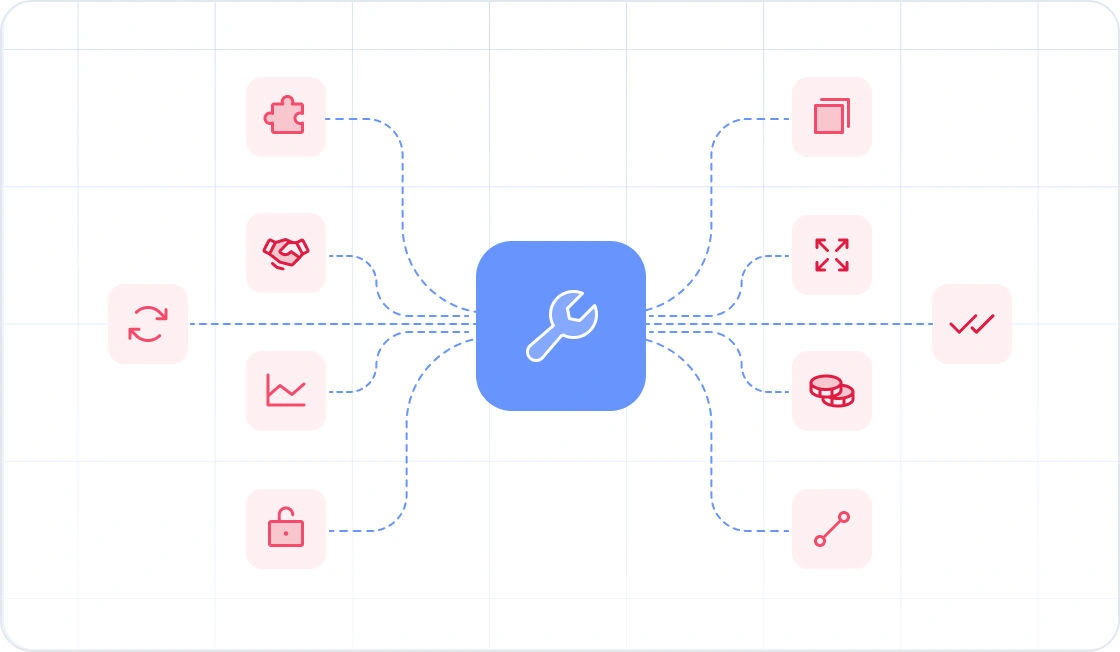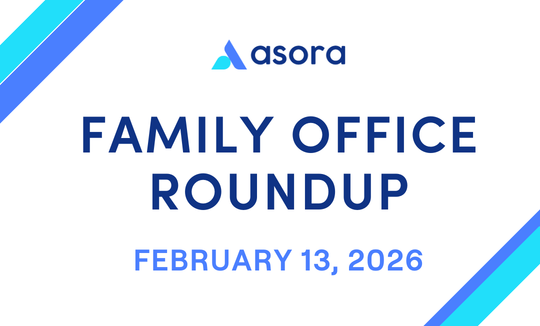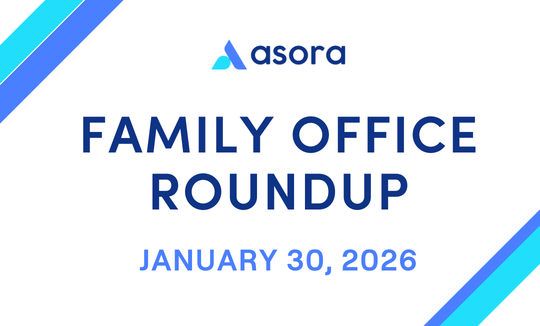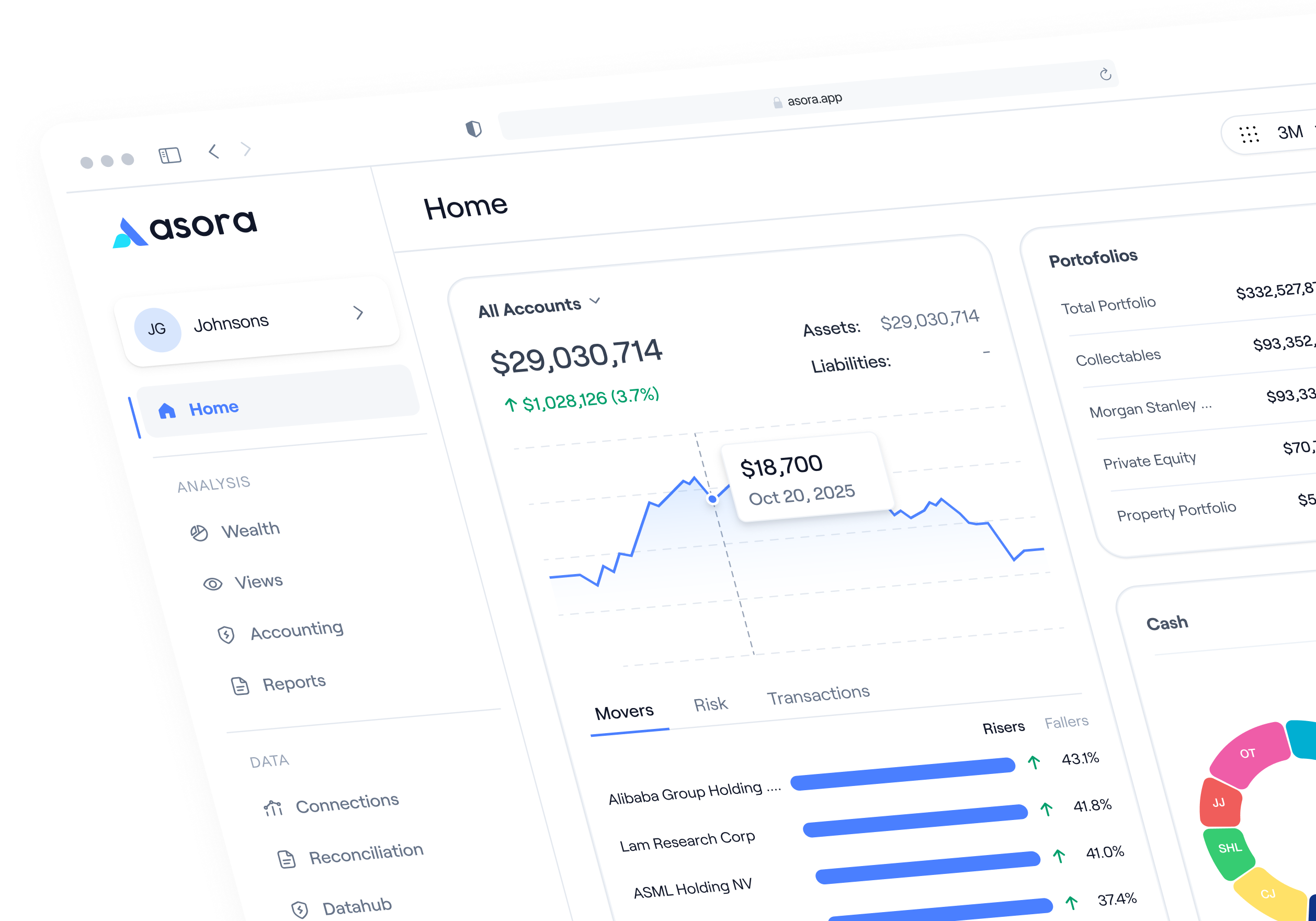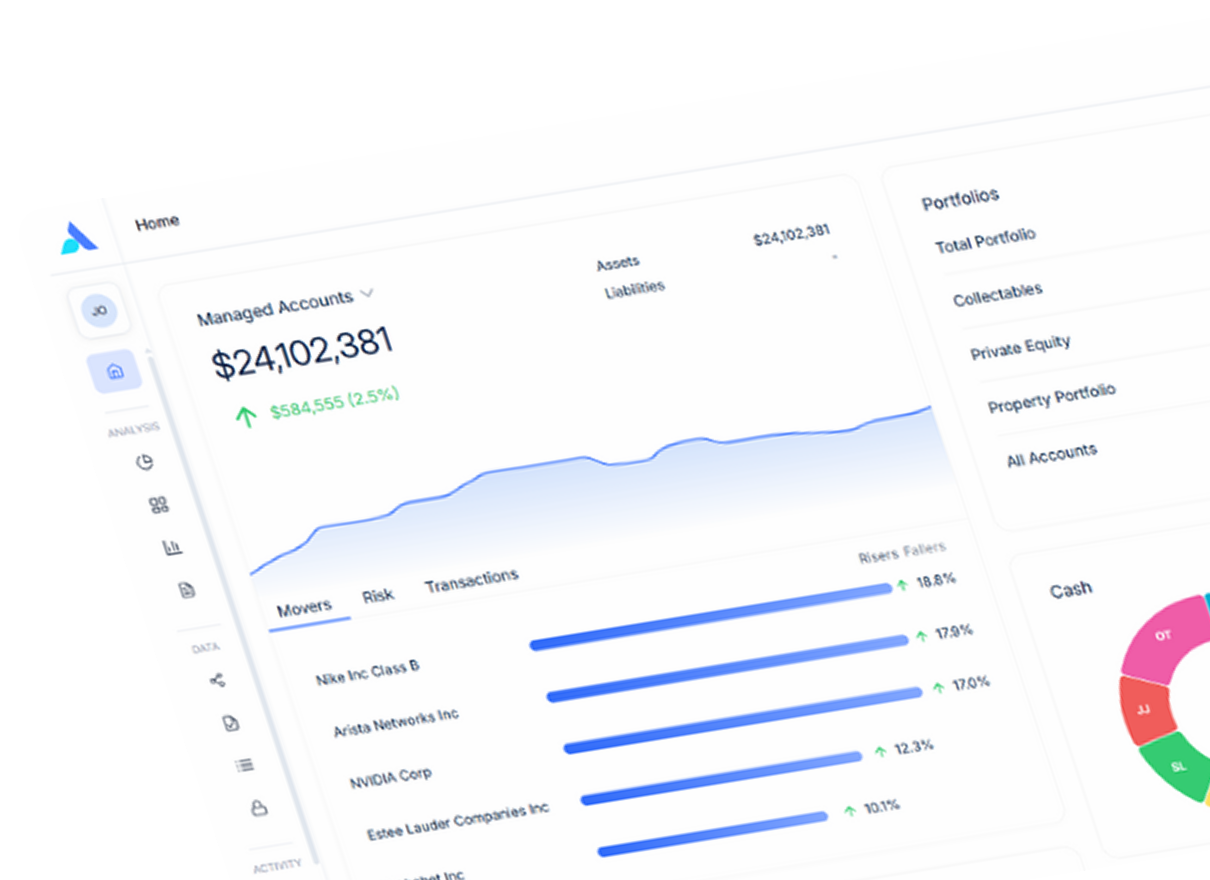Automate your family office
Schedule DemoHeading 1
Heading 2
Heading 3
Heading 4
Heading 5
Heading 6
Lorem ipsum dolor sit amet, consectetur adipiscing elit, sed do eiusmod tempor incididunt ut labore et dolore magna aliqua. Ut enim ad minim veniam, quis nostrud exercitation ullamco laboris nisi ut aliquip ex ea commodo consequat. Duis aute irure dolor in reprehenderit in voluptate velit esse cillum dolore eu fugiat nulla pariatur.
Block quote
Ordered list
- Item 1
- Item 2
- Item 3
Unordered list
- Item A
- Item B
- Item C
Bold text
Emphasis
Superscript
Subscript
TL;DR
Manual data aggregation poses significant challenges for family offices, including the need to consolidate data from multiple sources, security risks associated with handling sensitive data points, reporting delays that impact decision-making, and scaling issues as portfolios grow. Most family offices spend hours each week consolidating data from banks, custodians, and investment platforms into spreadsheets. Modern platforms extract timely feeds from banks and custodians, automate manual entry, and facilitate faster, more reliable reporting.
Data Aggregation in Family Offices
If you're running a family office, you know this routine: logging into five different bank portals, downloading statements, copying data into spreadsheets, reconciling discrepancies, and hoping you didn't miss anything, which complicates making data-driven decisions. Then doing it all again next month.
Manual aggregation isn't just tedious. It introduces security risks, slows down decision-making, and makes it easy to miss changes.
You're not alone in facing these challenges, and there are practical solutions that don't require hiring an entire IT department.
This article walks through the 10 most common data aggregation challenges family offices encounter and how to actually solve them.
Why Data Aggregation Matters For Family Offices
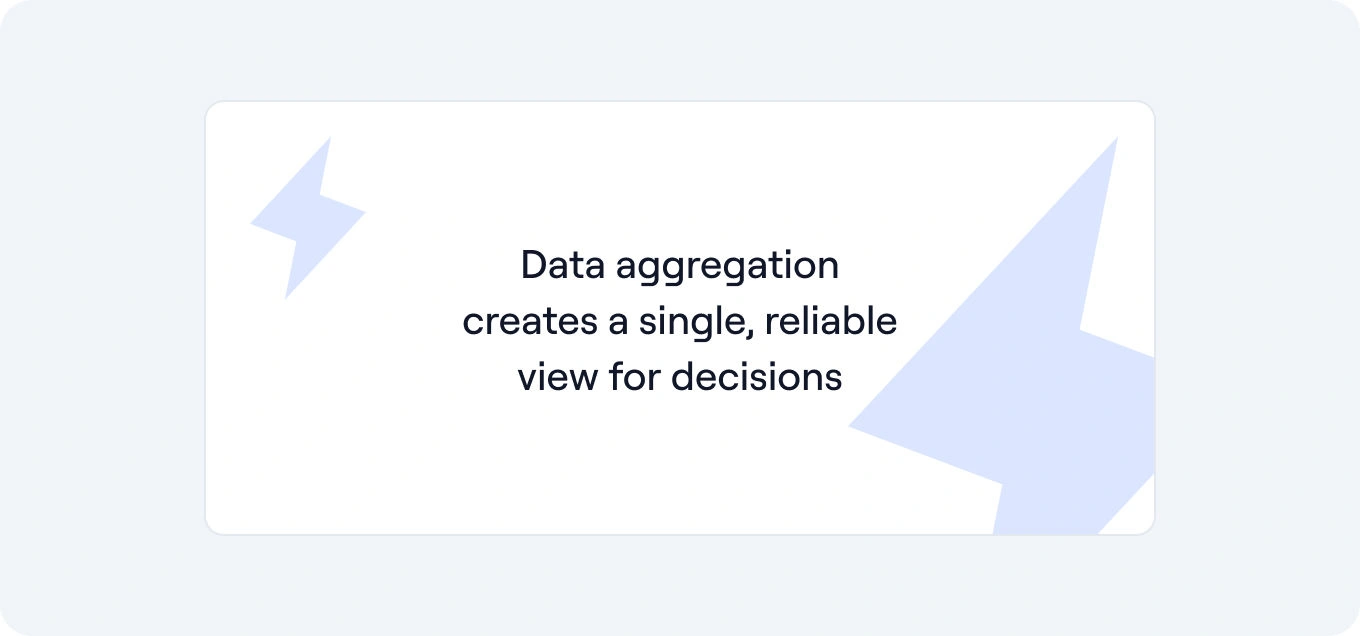
Before diving into specific challenges, let's first establish why the data aggregation process is so crucial for family offices, particularly in enhancing data accessibility.
Your wealth is probably spread across multiple custodians, banks, and investment platforms. You may have public equities with one broker, private equity investments tracked separately, real estate holdings in various entities, and alternative investments managed by different entities. Each source maintains its own data format, update schedule, and access method.
To make informed decisions about asset allocation, performance, or risk management, you need all this data in one place. To make allocation or risk calls, you need a single place to pull timely data, standardize it, and turn it into clear reports.
Manual consolidation works only until you add more banks, a second custodian, and private deals with quarterly PDFs. At that point, you need mixed aggregation: bank APIs, custodian feeds, broker links, and document/statement parsing for PE/real estate. As portfolios become increasingly complex and stakeholder expectations rise, manual processes often become bottlenecks in the workflow. Data aggregation and data aggregator challenges multiply.
That's when family offices begin searching for more effective solutions.
10 Manual Data Aggregation Challenges (and How to Fix Them)
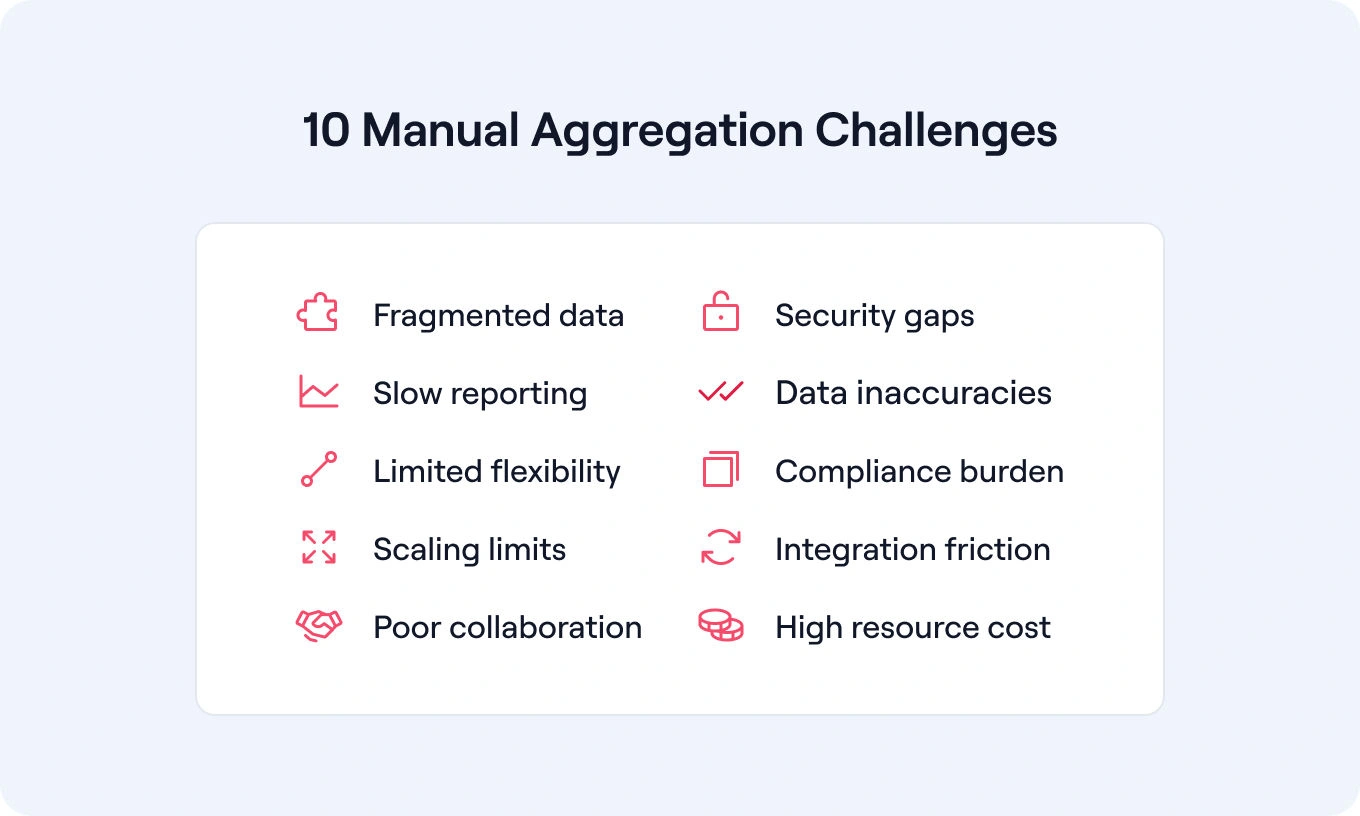
Family offices of all sizes encounter similar obstacles when aggregating data. Here are the most common data aggregation challenges and practical approaches to overcome manual data aggregation issues:
- Data fragmentation across multiple sources
- Data aggregation process security issues
- Inability to get timely reporting and data analysis
- Poor data quality and accuracy
- Limited customization for reporting
- Regulatory compliance complexity
- Scalability issues as aggregated data grows
- Integration challenges with existing systems
- Communication and collaboration barriers
- Cost management and resource allocation
1. Data Fragmentation Across Multiple Sources
The data aggregation challenge that affects nearly every family office: your financial data lives in dozens of different places.
Your checking accounts are with one bank. Investment accounts sit with multiple custodians. Private equity investments are tracked in PDFs from fund managers. Real estate holdings exist in property management systems. Collectibles might be in insurance spreadsheets.
Each data source has its own format, terminology, and update frequency. Getting all this disparate data into a unified view requires constant manual effort. You're essentially running a data integration project every time you need a report.
The fix: Implement automated data aggregation that automates data aggregation by connecting directly to your financial institutions, automatically pulling data from banks, custodians, and investment platforms, so you don't have to log in to multiple portals. For assets without direct feeds (e.g., private investments), choose a system that supports quick imports via standardized templates.
The goal is a single source of truth (and valuable insights you can trust) where all your family office data comes together, regardless of its origin.
2. Data Aggregation Process Security Issues
When you're dealing with sensitive financial information for ultra-high-net-worth families, data security measures become existential.
Manual data aggregation creates multiple security vulnerabilities. Statements get emailed without encryption. Files sit in unsecured folders. Spreadsheets are shared via email attachments. Multiple people have login credentials to financial accounts. There's no audit trail of who accessed what data points when.
Every manual step in your data aggregation process poses a potential risk of data breach. With data protection regulations like GDPR adding compliance requirements, family offices face both security and regulatory risks.
The fix: Move to a platform with robust security measures built in. Look for:
- End-to-end encryption for data in transit and at rest
- ISO 27001 certification and GDPR compliance
- Two-factor authentication for all users
- Granular access controls so you can limit who sees what
- Secure document storage that eliminates emailing sensitive files
- Regular security audits and penetration testing
- Data governance policies and implementation
With the right system, your data security improves while your team's workflow becomes easier. Learn more about how Asora handles security.
3. Inability to Get Timely Reporting and Data Analysis
Traditional data aggregation processes take days or weeks. By the time you've collected data from all sources, reconciled discrepancies, and generated reports, the business intelligence is already outdated.
This reporting delay affects everything. Investment decisions wait for quarter-end reports. Performance analysis lags market conditions. Questions from principals go unanswered because current data isn't available.
The aggregated data collection burden falls on your team, taking time away from further analysis and strategy. And when market conditions change quickly, you're making decisions with stale data from disparate data sources.
The fix: Use connected accounts that refresh on a regular cadence so you can pull current reports on demand. Instead of waiting for monthly statements, your aggregated data refreshes automatically (often daily) from liquid accounts.
This ultimately leads to better data mapping and data integrity.
This means you can pull current reports whenever needed. Performance monitoring becomes continuous rather than periodic. And your team spends time analyzing data instead of collecting it.
Look for platforms with customizable dashboards that allow stakeholders to access current information on demand, without waiting for someone to compile a report.
4. Poor Data Quality and Accuracy
Garbage in, garbage out. When your data aggregation process relies on manual data entry, errors are inevitable.
Someone types a transaction amount wrong. An asset valuation doesn't get updated. A new holding isn't added to the master spreadsheet. Currency conversions use outdated rates.
These data quality issues compound over time, undermining confidence in your reports and complicating statistical analysis.
Inconsistent data formats exacerbate the problem. One custodian reports positions by CUSIP, while another reports them by ticker symbol. Private equity funds use different methodologies for reporting committed versus invested capital. Real estate properties have varying valuation frequencies.
The fix: Effective data aggregation begins with automated data capture, which eliminates manual entry errors. When data flows directly from source systems, data accuracy improves immediately.
Look for platforms that include:
- Automated data validation to flag anomalies during real-time data aggregation
- Standardization engines that normalize raw data from different sources
- Data normalization and enrichment tools that standardise sources, map entities/securities, and resolve inconsistencies during ingestion and reconciliation.
- Reconciliation workflows that surface discrepancies for review
Some judgment will always be required. However, you can reduce the volume of issues and make it easier to identify and resolve the remaining problems.
5. Limited Customization For Reporting
Off-the-shelf reports rarely meet the exact needs of family offices. Every family has different reporting requirements based on their structure, investments, and stakeholder preferences.
One principal wants to see performance by asset class. Another focuses on entity-level returns. The CFO needs cash flow visibility. Family members want simplified summaries. Your accountant requires transaction details for tax preparation.
With manual data aggregation, creating custom views means rebuilding spreadsheets. Adding a new report dimension requires reworking formulas. Accommodating a new stakeholder's preferences means duplicating and modifying templates.
The fix: Modern platforms offer flexible reporting that lets you group data by data aggregator, entity, asset class, strategy, or any other dimension relevant to your family office. You define the structure once, then generate different views tailored to various audiences.
Look for systems where you can:
- Create custom portfolios grouping assets however it makes sense for your analysis
- Generate multiple report formats from the same underlying raw data
- Export to PDF, Word, or Excel when stakeholders need offline reports
Performance monitoring becomes more powerful when you can slice data in different ways without rebuilding your entire reporting infrastructure.
6. Regulatory Compliance Complexity
Family offices operate in a complex regulatory environment. Tax reporting requirements vary by jurisdiction. Investment regulations differ across asset classes. Data protection rules impose handling obligations.
And everything keeps changing.
Manual data aggregation makes compliance harder. When raw data lives in spreadsheets and email attachments, creating audit trails is difficult. Demonstrating data handling practices for GDPR compliance requires documentation that doesn't exist. Tax reporting requires assembling data from multiple sources right when you're busiest.
The fix: Look for data aggregation solutions that support compliance requirements:
- Complete transaction history for audit purposes
- Document storage with proper security and retention
- Standardized data formats that feed into tax preparation
- User activity logs showing aggregated data access (where required)
- Automated reconciliation that documents discrepancies and resolutions
Work with platforms that maintain recognized compliance certifications (ISO 27001, GDPR, SOC 2). Their compliance efforts support your compliance obligations.
For family offices managing accounting across multiple entities and jurisdictions, having properly organized, aggregated data from the start makes tax season dramatically less painful, especially when dealing with large volumes.
7. Scalability Issues as Aggregated Data Grows
The data aggregation process that works for $50 million in assets often breaks down at $150 million. What worked at five entities becomes unworkable at thirty.
Manual processes don't scale linearly. Doubling your holdings might triple or quadruple the time required for data aggregation. Adding new asset classes increases complexity exponentially.
Files get heavy, reconciliation cycles stretch, and ops time crowds out analysis.
The fix: Build on infrastructure that scales with your portfolio growth. Cloud-based solutions effectively handle growing data volumes without compromising performance. Look for platforms where adding accounts, entities, or users doesn't require fundamental architecture changes.
Consider how solutions handle:
- Large volumes of transaction data
- Multiple entities and complex ownership structures
- Various asset classes, including private assets that require manual inputs
- Growing numbers of users with different access needs
- Scalable historical data retention as your dataset grows
The goal is a system that grows smoothly as your family office evolves without requiring migration to entirely new platforms every few years.
8. Integration Challenges With Existing Systems
Many family offices have accumulated various systems over time. You might use QuickBooks for bill pay, a separate system for property management, custodian portals for investments, and spreadsheets for consolidated reporting.
Integrating these disparate systems is an ongoing challenge in data integration. Raw data doesn't flow automatically between platforms. Reconciling the same information across different systems creates extra work. Updates in one system don't reflect in others.
A phased rollout - starting with liquid accounts - allows teams to prove value before consolidating further.
The fix: When evaluating data aggregation solutions, understand the existing integration capabilities. Can the platform:
- Connect to your existing custodians and banks?
- Import data from legacy systems you plan to retire?
- Export data to the accounting systems you need to maintain?
- Work alongside other tools rather than requiring wholesale replacement?
For many family offices, a phased approach is most effective. Start by automating data aggregation for investment accounts, while continuing to utilize existing systems for operations. Gradually consolidate as you prove value and build team confidence.
The platform should serve as your central repository for wealth data, even if other systems are maintained for specific functions.
9. Communication and Collaboration Barriers
With manual aggregation, information sits in spreadsheets on individual laptops. Questions turn into email threads, access is fragmented and slow, and version drift means no one is sure which numbers are final.
This communication friction slows decision-making and creates confusion about what the current data actually shows.
The fix: Modern platforms enable collaboration by providing all stakeholders with access to the same underlying data, along with appropriate permissions.
Look for capabilities like:
- Role-based access so stakeholders see what's relevant to them
- Document management that attaches supporting materials to the relevant assets
- Mobile access so principals can review information from anywhere
- Comment and note features for collaborative decision-making
- Report sharing that ensures everyone's looking at the same numbers
When everyone works from a single source of truth, conversations become more productive, and decisions are made faster.
10. Cost Management and Resource Allocation
Sure, manual data aggregation seems cheap (no software costs, just staff time), but it's actually expensive when you calculate the actual cost.
Consider what your team spends on:
- Hours each month on manual data collection and entry
- Additional staff needed to handle growing data volumes
- Errors requiring rework and reconciliation
- Delayed decisions due to a lack of timely data
- Opportunity cost of team members doing data operations instead of analysis
Meanwhile, implementing proper data aggregation software involves upfront costs: software licenses, implementation time, staff training, and process changes.
The fix: Approach this as an investment decision. Calculate what manual data aggregation actually costs your family office in staff time, errors, and missed opportunities. Compare that to the all-in cost of automated solutions.
Many family offices find that practical data aggregation tools quickly offset their costs through time savings alone-and that's before counting improvements in data quality, security, and decision-making.
Look for transparent pricing models that clearly outline what you're paying for.
How to Move Beyond Manual Data Aggregation
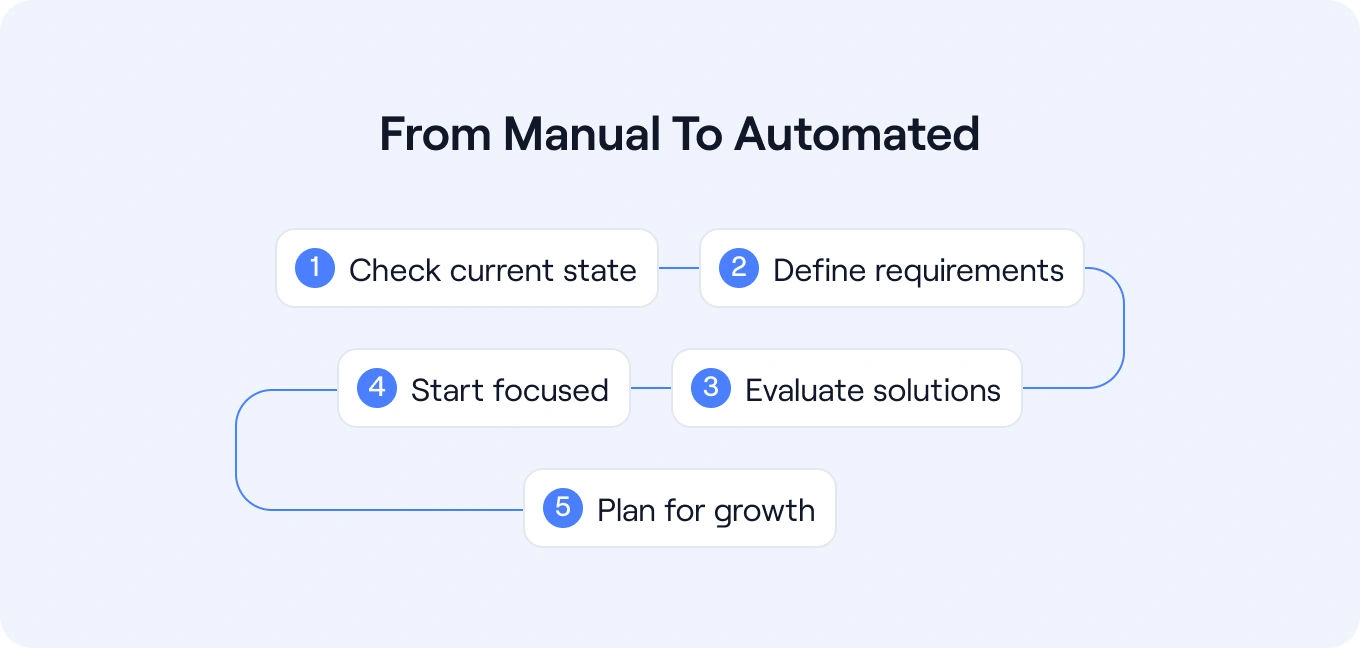
If you're still manually aggregating data, you're not alone. Many family offices find themselves in a similar position. But you also don't need to stay there.
Modern technology platforms designed specifically for family offices address these issues systematically. Most family offices begin with their most significant pain point (perhaps it's security concerns, reporting delays, or simply the time burden) and expand from there.
Here's how to make it happen:
- Check your current state: Document the actual time your team spends on data aggregation. Identify your most significant pain points. Calculate the actual cost of your manual processes.
- Define requirements: What data sources need to connect? What reports do stakeholders need? What security and compliance requirements must you meet? Who needs access to what information?
- Evaluate solutions: Consider platforms specifically designed for family offices, rather than generic wealth management automated tools. Prioritize those addressing your specific data aggregation challenges.
- Start focused: Begin with your liquid holdings or your most time-consuming manual processes. Prove value before expanding.
- Plan for growth: Choose solutions that scale with your family office, supporting more complex dataset needs as your portfolio and team evolve.
You're ultimately looking for data aggregation that happens automatically, securely, and reliably, freeing your team to focus on what actually matters: helping your family make informed decisions about their wealth.
Better Data Aggregation Starts With Better Tools
Data aggregation challenges aren't unique to your family office, but they're also not inevitable. The technology exists to overcome manual data aggregation issues and create a more efficient, secure, and accurate system.
Asora was explicitly designed to address these challenges for family offices. With automated connections to banks and custodians, consolidated reporting across all asset classes, robust security, and flexible analytics, it addresses all these challenges (and more).
If you're spending too much time on data operations and not enough time on wealth strategy, it may be time to find a more effective approach. Schedule a demo to see how automated data aggregation benefits could work for your family office.
FAQ
What is manual data aggregation, and why is it a challenge for family offices?
Manual data aggregation involves collecting data from multiple sources (banks, custodians, investment platforms) and consolidating it into spreadsheets by hand. It's challenging because it's time-consuming, error-prone, creates security risks from handling sensitive data via email, and doesn't scale as portfolios grow.
What are the main data aggregation security issues family offices face?
Security data issues include unencrypted emails with financial statements, spreadsheets shared via unsecured channels, multiple people having login credentials to accounts, a lack of audit trails, difficulty complying with GDPR, and inadequate access controls. Each manual step in collecting and consolidating data creates potential exposure points for sensitive information.
How can family offices overcome manual data aggregation challenges?
Family offices overcome manual data aggregation by implementing automated platforms that connect directly to banks and custodians. These systems eliminate manual entry, provide timely updates, include data validation tools, offer secure, encrypted data storage, and enable flexible reporting.
What should family offices look for in data aggregation tools?
Look for direct connections to major banks and custodians, support for multiple asset classes including private investments, automated validation and reconciliation, robust security with encryption and access controls, flexible reporting, scalability, mobile access, and transparent pricing.
How does automated data aggregation work and improve data quality?
Automated data aggregation eliminates manual entry errors, standardizes integrated data formats from different sources, flags anomalies through validation rules, and maintains complete transaction history. Relevant structured and unstructured data flows directly from source systems in standardized formats, reducing errors while making remaining quality issues easier to identify and fix.

